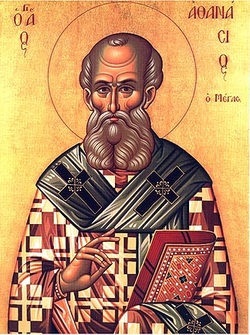
The Arians also accused Athanasius of having murdered the Bishop Arsenius. This Arsenius they kept shut up, and brought into the court a dead man's hand, which they declared had been his, and had been cut off by Athanasius to use in sorcery. But Arsenius escaped in the night, and when he appeared before all the Council whole and sound, the brazen-faced crime of the enemies of Athanasius was exposed. This appearance nevertheless they attributed to Athanasius being a warlock, and persisted still in their attack on him. He was driven into exile, and banished to Treves in Gaul. Thenceforth, under authority of the Emperor Constantius, that abettor of Arians, he was hunted to and fro with unceasing persecutions. He suffered hardships which it is difficult to believe. He was sent wandering all about the Roman world. He was twice more thrust out of his See, and again restored through the authority of Pope Julius of Rome, and with the protection of the Emperor Constans, the brother of Constantius, by decrees of the Councils of Sardica and of Jerusalem. The vindictiveness of the Arians never let him alone. In his third exile so great was the danger of his life from the pursuit of their undying hatred, that he had to lie hid for five years in a dry cistern, unknown to all men, save one of his friends who brought him food.
After the death of Constantius, Julian the Apostate, who succeeded him, allowed every sort of bishop who had been banished to return to their own Churches. Athanasius therefore returned to Alexandria, and was received with profound reverence. But it was not long before the same Arians got Julian to hunt him down again, and again it behoved him to fly. A band of soldiers were sent in pursuit of him to kill him, and as he fled up the Nile, their boat pressed hard on his. Athanasius, before they were yet in sight, had his own boat turned round, and went down the stream to meet them. As the vessels passed one another the murderers called out to ask if they knew where Athanasius was, and the servant of God himself cried to them in answer, Ye are close to him! whereupon they redoubled their exertions to ascend the stream, and Athanasius went peacefully down to Alexandria, and found means of concealment till the death of Julian. Yet once again he had to fly from another persecution at Alexandria, and in this his fifth and last exile he hid himself for four months in his own father's sepulchre. From all these so many and so great dangers did God deliver him, and at last he died in his own bed at Alexandria in the reign of Valens. He wrote much that is both godly and luminous in explaining the Catholic Faith, and governed the Church of Alexandria in great holiness, amid all changes of weather, for six and forty years.
Sermon by St. Athanasius the Bishop
'Apologia de fuga sua, ante medium'
Holy men of God, therefore, have learnt to take ensample from their Saviour (and the Same is and hath been the Teacher of all such, whether of old time, or in these latter days), and know how that it is lawful to baffle their persecutors by flying from them, and by lying hid when they seek them. For since they know not the day nor the hour wherein an all-seeing God hath ordained their end, they do not daringly give themselves into the power of such as hate them, but rather, knowing it to be written, My times are in thy hand, and that The Lord killeth and maketh alive, they endure unto the end, they wander about, as saith the Apostle, in sheepskins and goatskins, being destitute, afflicted, they wander in deserts, and hide in dens and caves of the earth, until either their appointed time come, or until more plainly God, the real Appointer of times, speaketh unto them, and chaineth up the persecutors, or manifestly giveth them over into the hands of the same, as may be his own good pleasure.




